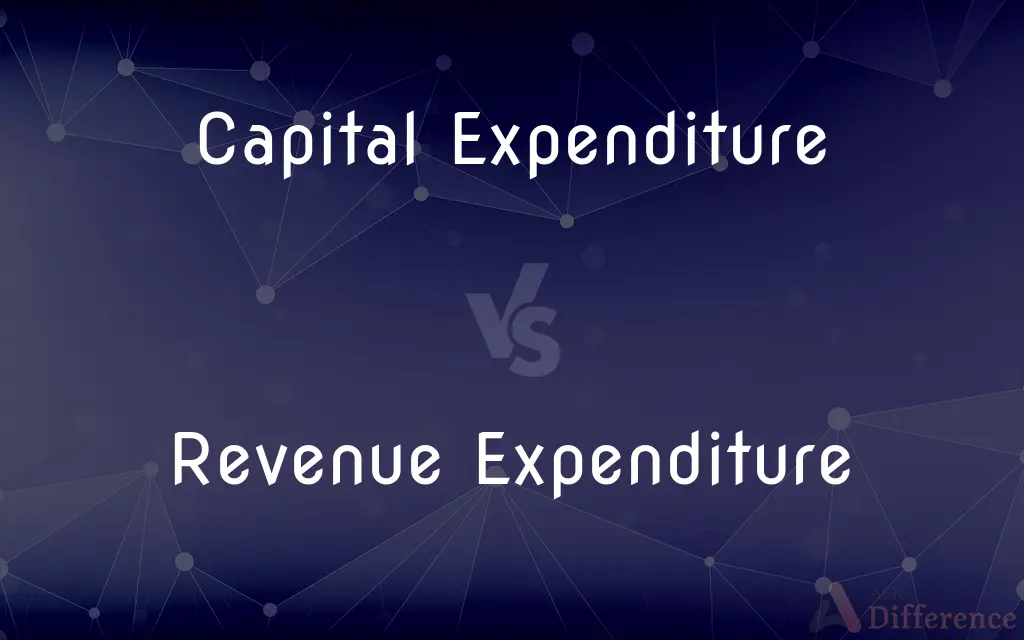Capital Expenditure vs. Revenue Expenditure — What's the Difference?
By Tayyaba Rehman — Published on December 2, 2023
Capital Expenditure is spending on long-term assets. Revenue Expenditure is spending on daily operations. Both impact a company's financials differently.

Difference Between Capital Expenditure and Revenue Expenditure
Table of Contents
ADVERTISEMENT
Key Differences
Capital Expenditure refers to the funds spent by a business to acquire, maintain, or enhance long-term assets, such as property, buildings, or equipment. Revenue Expenditure, on the other hand, refers to the regular spending necessary for daily business operations.
A distinguishing feature of Capital Expenditure is that its benefits extend beyond the current fiscal year. These expenditures are capitalized, meaning they are recorded as assets and then depreciated over time. In contrast, Revenue Expenditure offers benefits only within the current accounting period and is fully expensed in the year it's incurred.
Capital Expenditure often requires significant outlays of funds, as these purchases are substantial and made infrequently. This spending results in an increase in the asset base of a company. Revenue Expenditure is routine, recurring, and is directed towards maintaining the current asset base.
From an accounting perspective, Capital Expenditure is added to the asset side of the balance sheet, impacting the company's net worth. Revenue Expenditure, being an expense, is deducted from the revenue in the income statement, affecting the company's net profit.
Decisions related to Capital Expenditure usually require careful evaluation because of their long-term impact and significant financial commitment. In contrast, Revenue Expenditure decisions concern the smooth running of day-to-day operations.
ADVERTISEMENT
Comparison Chart
Nature of Assets
Long-term assets.
Short-term, operational expenses.
Duration of Benefits
Extend beyond current year.
Within the current year.
Accounting Treatment
Capitalized & depreciated.
Expensed in the year incurred.
Impact on Financials
Increases asset base.
Reduces net profit.
Decision-making Importance
High, infrequent decisions.
Routine, frequent decisions.
Compare with Definitions
Capital Expenditure
Investment in assets with benefits extending beyond a year.
Buying state-of-the-art machinery was a major capital expenditure for the factory.
Revenue Expenditure
Costs related to daily business operations.
Salaries and utility bills fall under revenue expenditure.
Capital Expenditure
Outlay creating future benefits.
Investing in renewable energy infrastructure was a significant capital expenditure.
Revenue Expenditure
Spending offering benefits within the current accounting period.
The money spent on raw materials is considered revenue expenditure.
Capital Expenditure
Spending on acquiring or improving long-term assets.
The company's capital expenditure included purchasing a new manufacturing plant.
Revenue Expenditure
Outlays maintaining existing asset functionality.
The cost of routine software updates is a type of revenue expenditure.
Capital Expenditure
Expenditure capitalized on the balance sheet.
The acquisition of adjacent land was recorded as capital expenditure in the books.
Revenue Expenditure
Routine expenses necessary for generating revenue.
Advertising costs are categorized as revenue expenditure.
Capital Expenditure
Funds allocated for assets enhancing future earning capacity.
Their decision to build a research facility was a strategic capital expenditure.
Revenue Expenditure
Expenditure expensed in the period incurred.
Repair costs for equipment are treated as revenue expenditure.
Common Curiosities
How does Capital Expenditure affect a balance sheet?
Capital Expenditure increases a company's asset base on the balance sheet.
Where is Revenue Expenditure recorded in financial statements?
Revenue Expenditure is deducted from revenue in the income statement.
Are monthly rent payments Capital or Revenue Expenditures?
They're Revenue Expenditures, being recurrent operational costs.
How does Revenue Expenditure impact profit?
Revenue Expenditure reduces net profit in the income statement.
Are wages and salaries Capital or Revenue Expenditures?
They're Revenue Expenditures, as they're recurring operational costs.
Is buying a new building a Capital or Revenue Expenditure?
It's a Capital Expenditure since it's a long-term asset.
How is the benefit of Capital Expenditure realized?
Through the extended use of the acquired or improved asset over multiple years.
What's an example of a Capital Expenditure in tech companies?
Buying servers or data centers can be Capital Expenditures for tech firms.
What's the main distinction between Capital and Revenue Expenditure?
Capital Expenditure relates to long-term assets, while Revenue Expenditure pertains to daily operations.
Are utility bills Capital or Revenue Expenditures?
They're Revenue Expenditures, being routine operational costs.
Is buying a patent a Capital Expenditure?
Yes, it's a Capital Expenditure as it provides benefits over multiple years.
Which expenditure type usually involves larger sums of money?
Typically, Capital Expenditure involves larger amounts due to the nature of assets acquired.
Why is distinguishing between Capital and Revenue Expenditure important?
It helps in accurate financial reporting and assessing a company's financial health.
Is staff training a Capital or Revenue Expenditure?
It's generally considered a Revenue Expenditure as it's operational, though some might argue for its capitalization.
How are long-term benefits of Capital Expenditure realized in financial statements?
Through depreciation or amortization spread over the asset's useful life.
Share Your Discovery

Previous Comparison
High Heels vs. Pumps
Next Comparison
Absolute Pressure vs. Gauge PressureAuthor Spotlight
Written by
Tayyaba RehmanTayyaba Rehman is a distinguished writer, currently serving as a primary contributor to askdifference.com. As a researcher in semantics and etymology, Tayyaba's passion for the complexity of languages and their distinctions has found a perfect home on the platform. Tayyaba delves into the intricacies of language, distinguishing between commonly confused words and phrases, thereby providing clarity for readers worldwide.













































